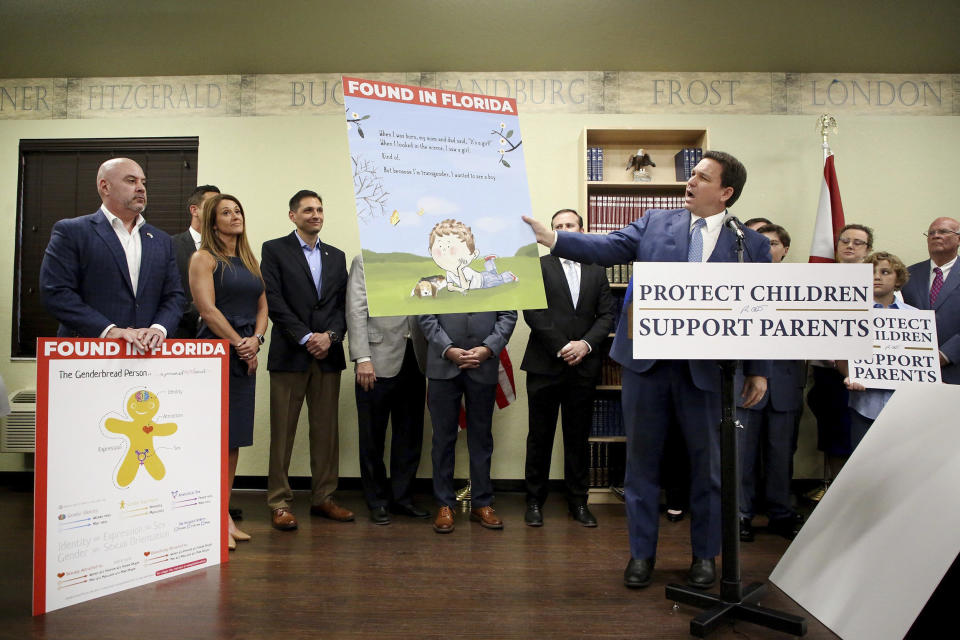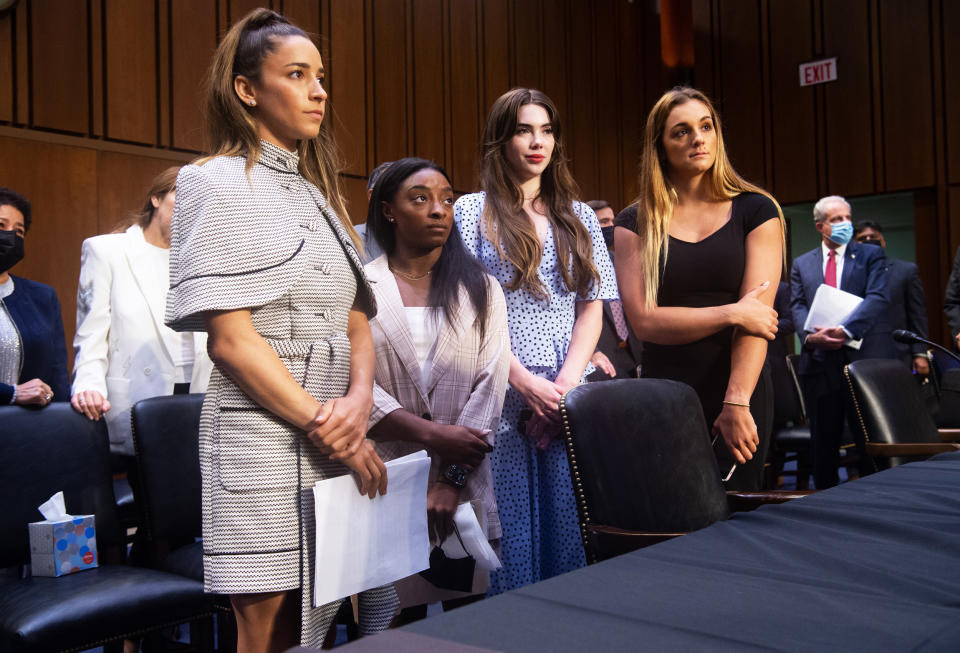What is 'grooming'? Why misusing the term could help sexual predators and hurt victims
This story discusses child sexual abuse. If you or someone you know has been sexually assaulted, you can call the National Sexual Assault Telephone Hotline at 800-656-HOPE (4673) or visit online.rainn.org.
The term "grooming" has been evoked by a number of politicians and their staff members as they advocate for laws that would limit or outlaw a teacher's ability to discuss LGBTQ+ issues and history in the classroom — what many call "Don't Say Gay" bills.
Experts and victims of child sexual abuse say many of those lawmakers are not using the term correctly — and that could actually help sexual predators and hurt child abuse victims.
“We need to know what it actually means so we can keep kids safe,” says Grace French, 26, a former competitive dancer and gymnast who was groomed and then molested by former USA Gymnastics national team doctor Larry Nassar. Nassar later was convicted of criminal sexual misconduct.
On May 4, Florida Governor Ron DeSantis’ press secretary, Christina Pushaw, claimed that people who opposed a state law that restricts teachers' ability to discuss LGBTQ+ issues in the classroom — including gender identity and gay marriage — are probably “groomers."
DeSantis, while signing the bill into law, claimed that those who opposed of the legislation "support sexualizing kids in kindergarten.”

What is grooming?
French, now 26, began seeing Nassar when she was 11 for a wrist injury. She told TODAY Parents he groomed not only her, but her mother, who was often in the room when she was being sexually abused.
Nassar, the former national team doctor for USA Gymnastics, pleaded guilty to sexually abusing minors under the guise of giving them medical treatment. He was sentenced in 2018 to up to 175 years in prison.
“He was very good at continuing to talk as he was abusing me, and continuing to talk to my mom,” French told TODAY. “He gained the trust of not only the child, but the parents as well and in order be able to continue to have access.”
Related: Ways parents can protect kids from sexual abuse
Part of grooming is gaining the trust of the parent, as well as the child being abused.
“Grooming is defined as a set of manipulative behaviors that the abuser uses to gain access to a potential victim, coerce them to agree to the abuse and reduce the risk of being caught,” Erinn Robinson, who works for the Rape, Abuse & Incest National Network (RAINN), a nonprofit anti-sexual assault organization, told TODAY Parents.
French, who is now the founder and president of The Army of Survivors, a national organization that advocates for and supports child athlete survivors of sexual violence, says Nassar’s grooming techniques were, initially, subtle.
“When grooming, perpetrators often start with desensitization to touch,” she explained. “So what he would often do is put his arm around me when we were walking into the exam room, or give me a hug. It’s something he would continue to do for years, so I would be desensitized to that type of touch.”
Why misusing the term “grooming” is dangerous
Dr. Jessica January Behr, a licensed clinical psychologist practicing in New York, says that when politicians use the term “grooming” or claim teachers are indoctrinating children when discussing sexual identity, gender and other LGBTQ+ issues, they’re “insinuating that the LGBTQ+ community is predatory.”
There's no evidence that there's more predatory behavior in the LGBTQ+ community than any other population.
On the other hand, there is evidence that LGBTQ+ people are more likely to be victims. According to one 2020 study by the Williams Institute at UCLA School of Law, in which researchers analyzed data from the 2017 National Crime Victimization Survey, people in the LGBTQ+ community are four times more likely than non-LGBTQ people to be the victim of a violent crime, including rape and sexual assault.
Related: ‘It’s not safe’: Parents of transgender kids plan to flee their states as GOP bills loom
French says misusing the term also harms victims of actual grooming.
“I find it really frustrating, and my heart goes out to the people in the LGBTQ+ community because it insinuates that being gay or being a part of that community is abuse, which it is not,” French said. “And to me it’s so backwards, because the abuse I experienced will cause me trauma for the rest of my life. And the abuse of not being able to come forward or identify or be educated about sexuality causes trauma.”
French says misusing the term also puts people, particularly children and teenagers, at risk of being groomed and eventually victimized.
“We need to be able to identify, exactly and accurately, the stages and signs of grooming,” French said.
“It’s so incredibly important to use this term correctly, because if we don’t understand it — and we have these assumptions about what it can or can’t be — then it’s harder and harder for grooming to be identified and perpetrators are going to be able to get more access to children and to victims,” she explained.
What are the signs of grooming?
Behr says there are a number of signs of grooming to look out for.
"The idea is that the person doing the grooming is trying to build trust with their victim," Behr said. "They'll share and keep secrets, and provide a space that feels safe and controlled and that perhaps the child isn't getting in other areas of their lives. They'll begin with light, seemingly appropriate touch, then push it further and further."

Robinson says other signs include:
Victim selection: Abusers often observe possible victims and select them based on ease of access to them or their perceived vulnerability.
Discussion of sexual topics: Abusers may show the victim pornography or discuss sexual topics with them, to introduce the idea of sexual contact.
Attempt by abusers to make their behavior seem natural: For teens, who may be closer in age to the abuser, it can be hard to recognize tactics used in grooming. Be alert for signs that your teen has a relationship with an adult that includes secrecy, undue influence or control, or pushes personal boundaries.
How parents can help protect their children
There are a number of ways and age-appropriate discussions parents can have with their children that protect their children from grooming and sexual abuse, Behr says.
"Body awareness and knowledge and correct language are all strong, protective factors," she explained. "They might not even have words to describe something that happened to them."
That's why doctors recommend parents use and teach young children correct words for body parts, like penis instead of "pee pee" and vagina instead of "down there."
Behr says parents should also work to create a "safe space and a clear communication line of openness" so their child or children know they're a safe person to talk to.
Robinson also noted that while anyone can be a perpetrator of child sexual abuse, statistically a child is more likely to be abused by a family member or someone they know.
"It's important that parents monitor any adult that has access to their children," she added.
She also encourages parents to monitor their children's online and social media use, as grooming can also involve "adults creating fake profiles and posing as children or teens in order to befriend someone and gain their trust."
"This may be the first step towards sexual abuse or online stalking or harassment," she added. "Rather than banning kids from going online, introduce more freedom as they get older, and make sure they are attuned to the risks and are comfortable talking to you about what they experience."
Parents can visit InternetMatters.org to learn more about how grooming occurs, and can learn how to recognize warning signs of online grooming from the National Center for Missing and Exploited Children.

